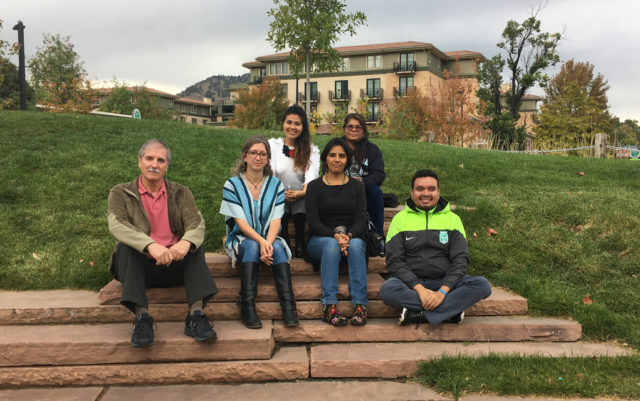
The justification for “fracking is based in two lies — the first lie is to say that it is safe and nothing happens. That it doesn’t contaminate water, that it doesn’t generate seismic activity, that it doesn’t affect health,” says Carlos Santiago with the Colombian organization Water, Territory and Ecosystems Defender Corporation — CORDATEC. “And the other big lie related to that one is that they always use the example of the United States to say that in these places everything is going great, fracking is a marvelous thing and people are very happy with it.”
Santiago is visiting Colorado with a group from the Latin American Alliance against Fracking, a network of 50 or so organizations from Mexico to Argentina working to prevent the proliferation of the extractive process across the continent. The technique has exploded in recent years across the region in places like Mexico, Argentina and Chile, with exploration well underway in other countries such as Colombia. There are also concerns about Brazil and Bolivia, where exploration is still nascent.
The group was in Boulder Oct. 3 to talk about human rights issues associated with oil and gas development in the Americas at a public hearing of the Inter-American Commission on Human Rights (IACHR) at the University of Colorado Boulder Law School. Founded in 1959, the IACHR is charged with protecting and promoting human rights throughout North and South America by consulting with the Organization of American States (OAS) on such matters.
“We are [asking] that the commissioners focus on the impacts of fracking as a human rights issue and understand that the fracking is a problem because it involves a right to health, right to the environment, right to food and water, and there has also been problems with the right of indigenous people and [access to] information,” says Liliana Avila, a Colombian lawyer with the InterAmerican Association for Environmental Defense (AIDA). “The IACHR is a relevant actor in our claims for environmental justice. If things don’t go as we wish, we can use the Inter-American assistance to demand effective measures from the states to prevent and protect the human rights of people.”
The impact of oil and gas development on human rights is a widespread concern, as many in the group described a lack of government transparency, democratic process, and in some cases, violence against protesters.
“Following the pattern here in [the United States of] America, they started fracking without consultation from native people as mandated by our constitution,” says Roberto Ochandio from Argentina, a retired oil engineer who now spends his time educating the public about the environmental hazards of fracking and mining processes. “They don’t respect the formalities about making a public discussion.”
According to the U.S. EIA, Argentina’s Vaca Muerta region has the world’s second largest shale gas reserves, and the area in the western part of the country is beginning to be developed, as the state-owned oil company, YPF, expects oil and gas production in the country to grow 35 percent this year.
One of the largest concerns about what’s happening in Vaca Muerta, Ochandio says, is the complete disregard for the indigenous Mapuches people who live in Western Patagonia, where most of the oil reserves are located. It’s a common theme among all of the members of the Alliance visiting Boulder: While the governments may be complicit in oil and gas development, the indigenous people and communities the projects will affect aren’t being invited into the process.
“In Mexico, it has been something that has happened in darkness, without transparency, or information to the public,” says Alejandra Jimenez with the Mexican Alliance against Fracking.
Since 2013, when the Mexican government deregulated the energy sector to allow private investment, development has surged in two main regions, Jimenez says, the Aceite Terciario del Golfo (ATG) along the Gulf of Mexico and the Burgos Basin farther north.
“The environmental issues, we are starting to see them, and we will see them more and more, as they become more evident in five to 10 years,” Jimenez says. “But the social issues are very immediate.”
She says fracking developments have completely changed the economy of the region, as people have moved from agriculture to oil fields. Foreign workers have also been brought in, and with them came an increase of violence, prostitution and drug trafficking in the region.
While here, the Latin American Alliance against Fracking is meeting with local groups involved in the effort to limit and/or ban fracking along the Front Range. They also planned a visit to Firestone, the community where a house exploded and two people died, due to uncapped flow lines in April 2017.
“We would like to tell people in Colombia that there are houses exploding here, that people are dying here,” Santiago says.
By uniting across country and culture, the Latin American Alliance against Fracking hopes to amplify the voice of local communities fighting oil and gas development on the ground across the continent, most of whom, they say, don’t want fracking.
“The government and the oil companies don’t like it when they see people from different countries united, they don’t like the union of the people inside their countries and even worse if they are united with other countries,” Ochandio says. “This is the best we can do to show the governments that we don’t like what they are doing.”














